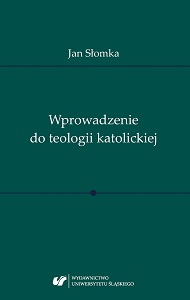Wprowadzenie do teologii katolickiej
An introduction to Catholic theology
Author(s): Jan Słomka
Subject(s): Christian Theology and Religion, Theology and Religion
Published by: Wydawnictwo Uniwersytetu Śląskiego
Keywords: Catholic theology; theological method; modernity; postmodernism; the conflict between science and religion
Summary/Abstract: This very Introduction to Catholic theology is separated into two distinctive parts. First of them constitutes a discussion of theology in the Catholic Church. Therein, the field of theology itself – substantially different from religious studies due to the prerequisite of belief – is presented. Next, the pillars of Catholic theology are comprehensively described: Tradition, represented by the Magisterium of the Catholic Church as well as its documents and Divine Revelation in the world.What is distinctively outstanding is the God’s revelation in Jesus Christ, hence Christianity is a religion of the person, namely, the person of Jesus Christ. It is Jesus alone who indicates the Holy Scripture as a revealed text. Therefore, the Holy Scripture remains only a resultant topic together with its divinely inspired character and rules of interpreting the Scripture valid in the Catholic Church. As an associated topic, the fundamentalism in reading the Bible is also addressed, wherein the author points out why such an interpretative mode is at odds with Catholic approach to the Bible and explains what exactly is the fallacy of fundamentalist understanding of the Scripture. The following section of the book is devoted to the role of authority in theology, and then, owing to special character of this relation, the close relation of theology and philosophy is presented. Part two entitled “Theology in the university” depicts the situation of theology as one of the academic fields practiced at modern universities. Particularly: sources and origins, aims, as well as the theological method and scholarly methods utilised while practising theology were discussed. Especially close attention was given to specificity of language used by theologians. Modern academia, not unlike the entire modern European culture, is heavily influenced by the Enlightenment heritage. What, therefore, necessitated the author’s analysis was Catholic theology’s attitude towards the Enlightenment breakthrough and, cursorily, towards the latter’s contemporary ramifications, that is, postmodernism. Amongst the crucial problems investigated by theologians of the modern era is the mutual relationship of theology and experimental sciences. Due to the so-called conflict between science and religion, stemming from the dissemination of the theory of evolution in the world of knowledge, theological references to earth sciences and human sciences gain their weightiness. The study is concluded with the discussion of major theological disciplines: fundamental, dogmatic, moral theology, spirituality theology, and practical theology. The said disciplines’ research areas are described, along with their methodological specificity and relations to philosophy and modern sciences.
Series: Teologia
- E-ISBN-13: 978-83-226-3472-1
- Print-ISBN-13: 978-83-226-3471-4
- Page Count: 164
- Publication Year: 2017
- Language: Polish
- eBook-PDF
- Sample-PDF

